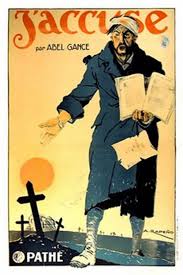
Francois Laurin (Severin-Mars) is a brutal and jealous man. He is married to Edith (Maryse Dauvray), the daughter of Maria Lazare (Maxime Desjardins). They live in a small rural village in the south of France. Also in the village are Jean Diaz (Romuald Joube) and his mother (Mancini). Edith and Jean are lovers. Francois is aware of the affair. Jean is a poet and a pacifist.
When war breaks out Francois sends Edith to stay with his parents and he goes to war. Edith is captured by the Germans and raped. Edith gets pregnant and has a daughter, Angele (Angele Guys). Jean finds out that Edith has been taken by the Germans and joins the service to avenge her capture.
After going through officer training Jean is assigned to the same company that Francois is fighting with. Together in the foxhole Jean discovers that Francois does actually love Edith and is devastated at her disappearance. They agree to put their differences aside and fight in honor of Edith.
Four years later Jean becomes ill but refuses to ask for a discharge. Francois writes to his father-in-law to ask him to have Jean’s mother talk him into coming home. Maria sends Francois a letter telling him that Jean’s mother is also ill. Jean decides to come home to be with his ill mother. Not long after he arrives, his mother succumbs to her illness.
Edith returns to the village but has with her a toddler she has named Angele (Angele Guys). Edith reunites with Jean and explains to him that Angele is a child born from rape. The father is an unknown German and was one of many that raped her. Jean agrees to take care of the child and not let Francois know about it since Edith believes he will kill Angele. Francois returns home on leave. He thinks that Angele is Jean and Edith’s child. Eventually he finds out about the circumstances of Angele’s birth. Francois and Jean, having bonded over their mutual love for Edith, agree to return to war and avenge what happened to Edith, on the battlefield.
“J’accuse” was released in 1919 and was written and directed by Abel Gance. It is a French war horror silent film with anti-war propaganda elements. It takes place in France during WWI. The film was restored by Lobster Film Studios in Paris and the Netherlands Filmmuseum.
The film contains a powerful opening scene and some really cool imagery and symbolism, especially toward the end with the “March of the Dead” sequence. Actual footage from the battle of St. Mihiel was used in the film. Gance, who had been in the service and returned, filmed some of the battle. 2000 real soldiers were used in the “March of the Dead” sequence. They were on leave from the front. Most of them returned to battle and were killed within the next few weeks. It is said that they played the dead knowing that they, in all probability, would be dead for real in a few weeks. Many of the letters used by Gance in the intertitles were penned by actual soldiers who died during the war.
The title of the 1919 film J'accuse translates to "I Accuse" in English. When asked what was accused, Gance is said to have replied that it was intended to convey his accusation of the war, men, and universal stupidity. Gance was not really political but was very much anti-war.
The film was altered significantly for its American release.

